
Interactive: Marathon man’s remarkable journey to Tokyo 2020


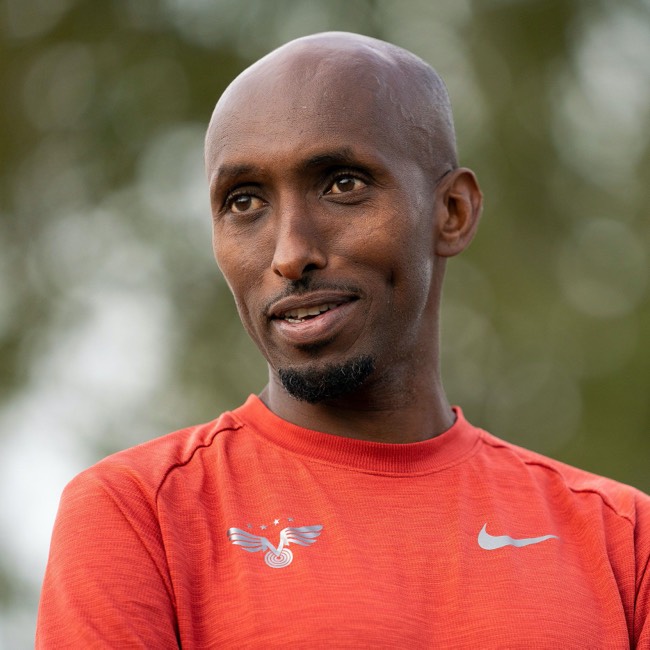
one man’s journey to Olympic competition

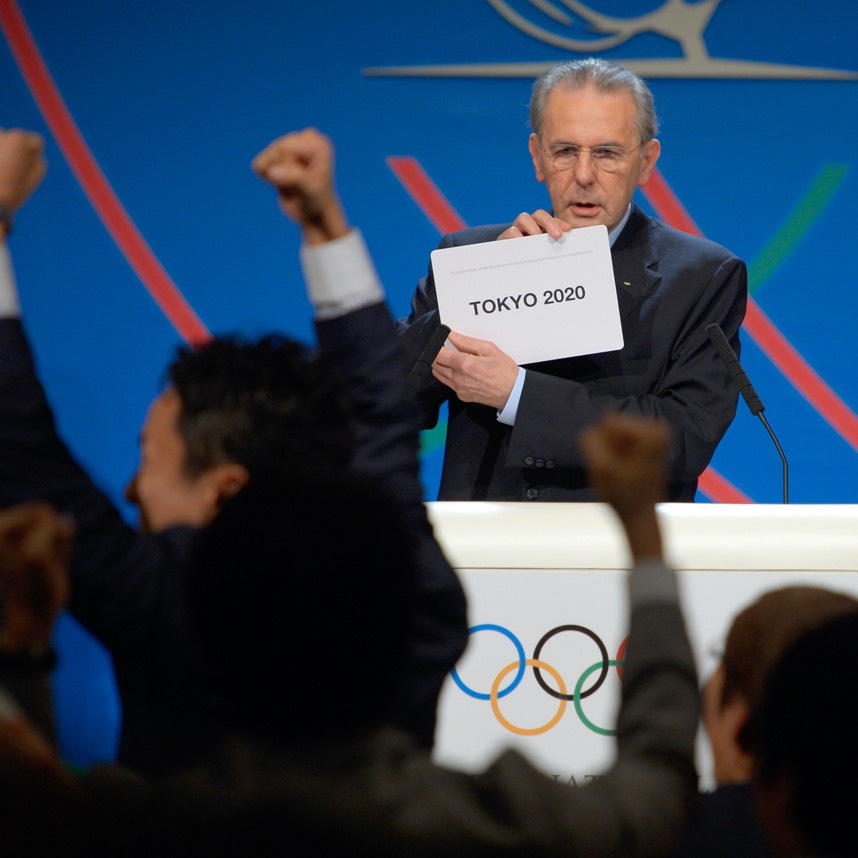
echoes the world’s trek to the Games
By Eryn Mathewson Published July 22, 2021
The extraordinary journey to Tokyo 2020
The distance of a marathon is 26.2 miles. As we go through US marathon runner Abdihakim “Abdi” Abdirahman’s road to Tokyo, we tick off the milestones and myriad challenges for competitors and organizers to reach this year’s Games.
The Tokyo Olympics are finally happening and Abdihakim “Abdi” Abdirahman is ready — despite new rules, no fans, and many protests against hosting the Games during a pandemic.
He’s sympathetic to concerns about keeping residents, athletes and their support staff safe during the massive 16-day event.
He also really wants to compete in the marathon — the race he’s been training for, for over a year. Qualifying for the Games was hard, and staying healthy and in shape during a pandemic was arguably even harder.
0.7 miles
‘A safe and secure Olympic Games’
In September 2013 — following a vote in Buenos Aires, Argentina — Tokyo was chosen as the host of the 2020 Olympics ahead of Istanbul and Madrid. It will be the second time that Tokyo has hosted the Summer Games, having previously done so in 1964. A large crowd watching at an outdoor screen in Tokyo cheered when the announcement was made at 5:20 a.m. local time, and then-Prime Minister Shinzo Abe pledged that the city would stage “a safe and secure Olympic Games.”
But Abdirahman will tell you it was all worth it. This will be his fifth trip to the Olympics, and at 44, it could be his last.
“It’s been a difficult time … I’m just going to go out there and give it my best. I’m just going to worry about what I can control,” Abdirahman tells CNN.
A new normal
The pandemic is likely to make it his most unique Games. Everything — from the way he trained to the way the Games are being coordinated — is a bit different from years past. In a typical year, Abdirahman and the rest of the US Olympic marathon team would head to training camp in Japan weeks in advance to acclimatize to the terrain and weather.
1.4 miles
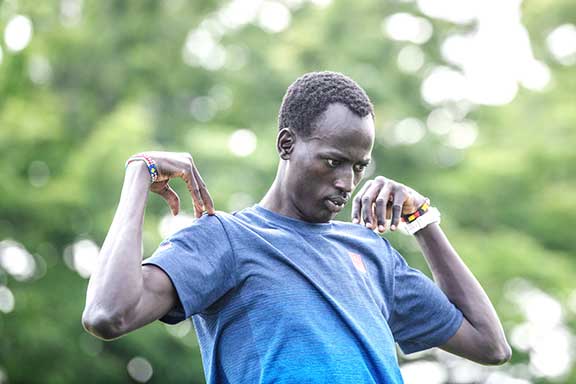


Abraham Majok Matet Guem
Since November 2019, South Sudanese athlete Abraham Majok Matet Guem has been living and training in the Japanese city of Maebashi in Gunma prefecture — about a two-hour drive from Tokyo. The 1,500m runner is one of four athletes from South Sudan, along with a coach, who have been based in Japan in the build-up to the Games. The athletes have gotten to know Maebashi residents, sampled the local fare and attended Japanese and computer classes four times a week. Maebashi is also offering financial support to the athletes through t-shirt sales and donations by local businesses.
Read more
“I’m doing it for my country, not for myself. I want to bring peace in my country.”
AFP/Getty Images/CNN Illustration
But the pandemic and concerns over safety will keep Team USA at home up until about a week before the race. Abdirahman said he’ll arrive in Tokyo in late July.
Japan’s capital is under a state of emergency because of rising Covid rates, so he and roughly 11,000 other athletes will be subject to a range of strict protocols that limit socializing, physical touch and travel between all 42 Olympic venues.
“I don’t look at age as ‘you’re old … you can’t do this.’ It’s just a number.”
I don’t look at age as “you’re old …you can’t do this.” Age is just a number. You know, just as long as you believe in yourself and you put the work and dedication, why not?
Show full transcript
Athletes have also been asked to embrace artificial crowd noise because live spectators are not allowed. Chanting, high fives and hugs have been banned, while mask-wearing will be required unless sleeping, eating, training or competing. Athletes from countries severely impacted by the Delta variant will be subject to stricter surveillance before they arrive and after they leave Tokyo. A handful have tested positive within the Olympic village so far.
Being vaccinated for Covid-19 is not mandatory for athletes. Pfizer/BioNTech pledged to donate its vaccine, but it’s unclear how many athletes have actually received the shots. Only about 23% of Japan’s 126 million residents have been fully vaccinated, but government officials are pushing to increase this number before the Games begin.
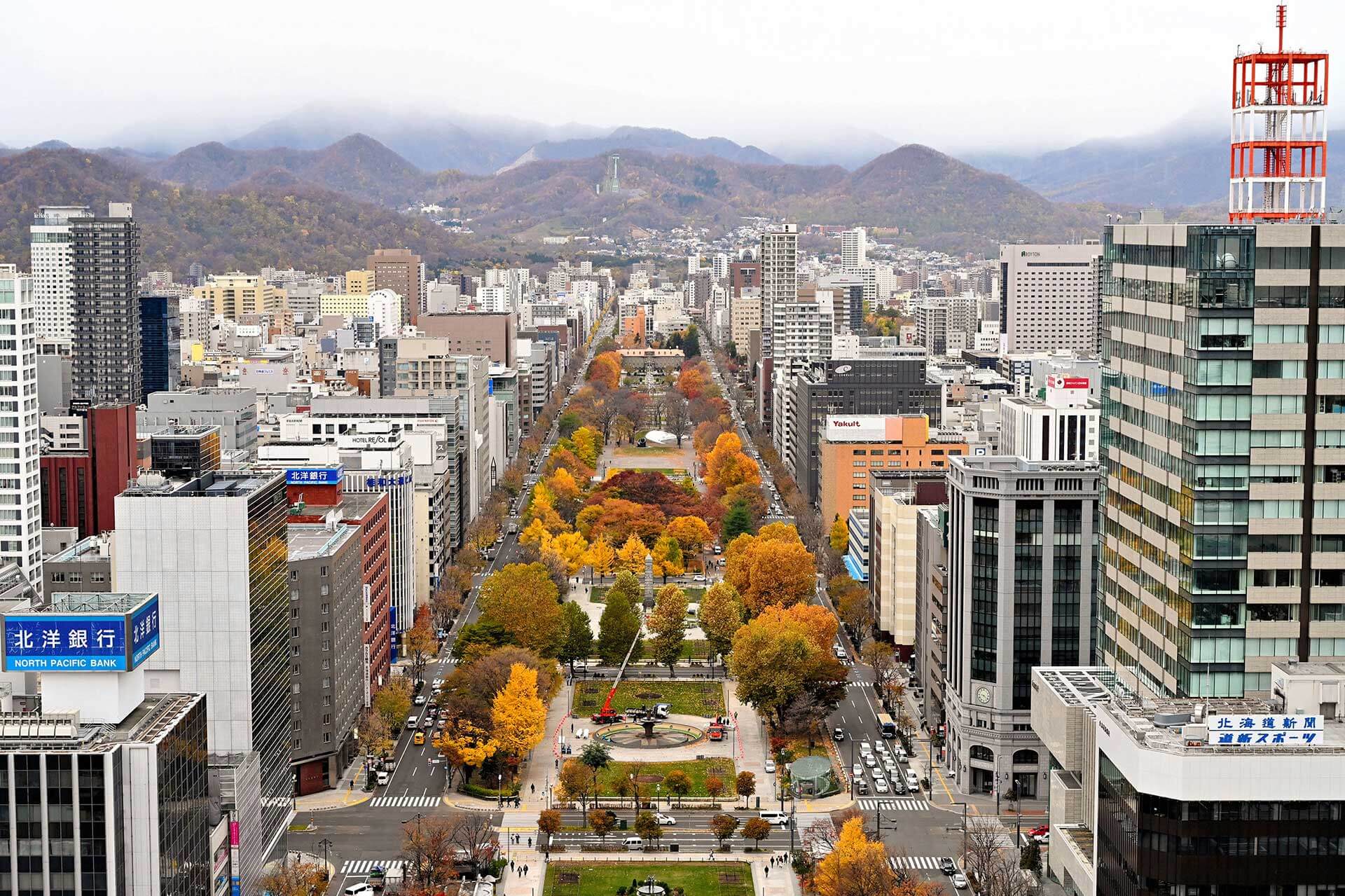
A view of Sapporo Odori Park — venue for the Olympic Marathon and Race Walking events — is seen on November 7, 2019. The Asahi Shimbun/Getty Images
The men’s Olympic marathon is scheduled for August 8, the last day of the Games. If all goes according to plan, athletes will run the 26.2-mile race in Sapporo — a hot and humid city that sits about 500 miles north of Tokyo, near the tip of Japan. It was chosen to host the marathon over Tokyo because its temperatures are slightly cooler.
The race will start in Sapporo’s Odori Park and then lead runners into the city to follow a three-loop course. Race walking events will also take place there, despite concerns and frustrations from city officials who don’t feel prepared to provide Covid-related health facilities or staffing for athletes and their delegations.
The marathon has been an official Olympic event since the first iteration of the Games took place in 776 BC. The inspiration for the race stems from a mythic run from Marathon to Athens, Greece in 490 BC. Legend has it that a professional messenger named Pheidippides ran the 40-kilometer distance to deliver a message: the Greek Army had defeated the Persian Army.
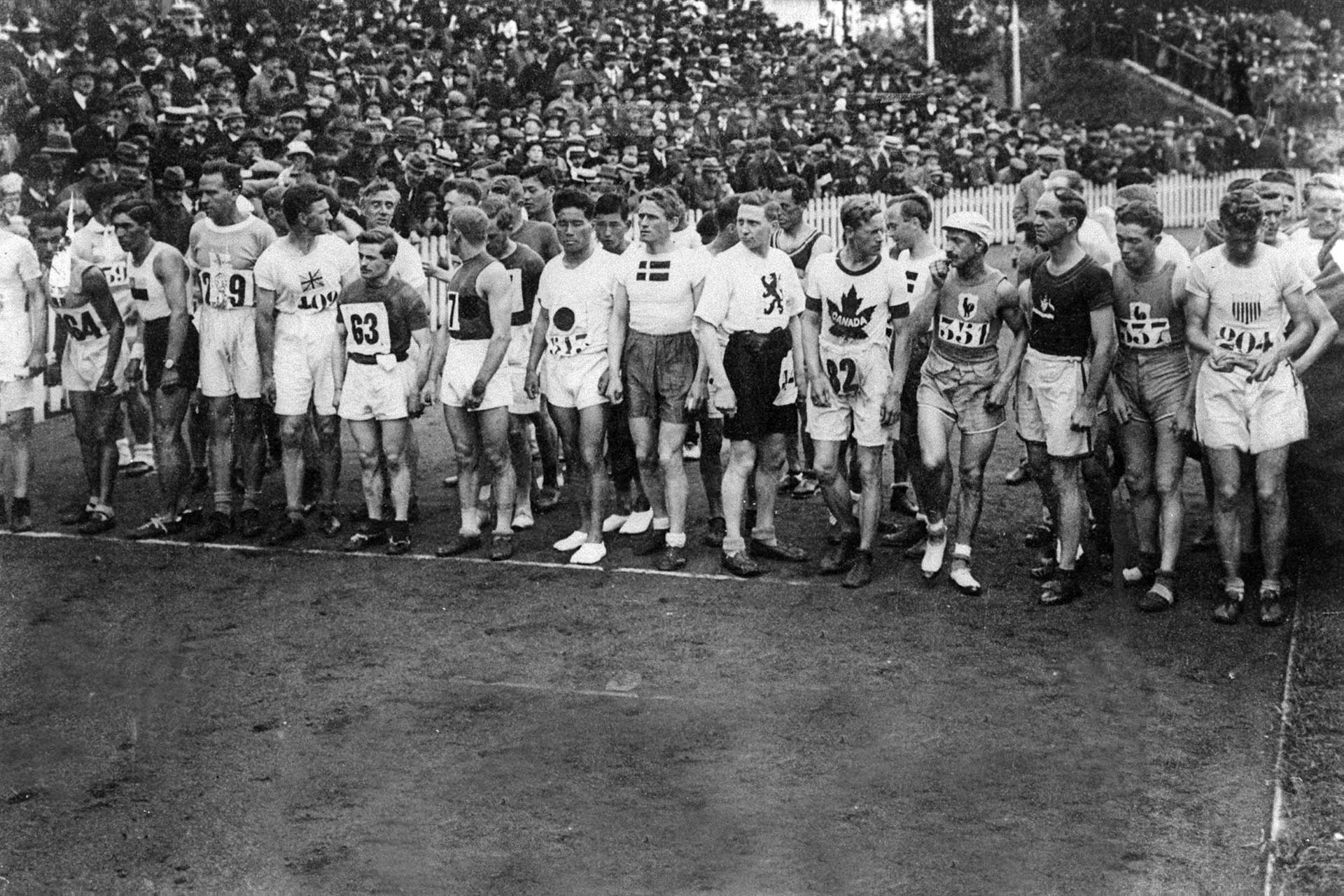
Runners line up for the marathon during the Antwerp Summer Olympics on August 22, 1920 in Antwerp, Belgium. The following year, the 26.2-mile distance was made official. The Asahi Shimbun/Getty Images
The marathon was resurrected when Baron Pierre de Coubertin established the modern Olympic Games in 1896. Just over 20 men lined up at the start, but only nine ended up finishing the race. The winning time was 2:58:50 — almost an hour slower than the current men’s world record. The 26.2-mile distance was made official in 1921.
When Abdirahman gets to the starting line, over 100 other competitors are expected to be there with him.
6.2 miles
From cellphones to Olympic medals
In July 2019, exactly one year out from the original opening ceremony, the Tokyo 2020 medals were revealed. Melded from copper and zinc found in donated cellphones and other electronics, the medals have a pebble-like appearance and measure 8.5 cm in diameter. Then in December that year, Tokyo’s 68,000-seat National Stadium was inaugurated. It cost 157 billion yen ($1.4 billion) and is scheduled to host the opening and closing ceremonies for the Olympics and Paralympics, as well as football matches and track-and-field events during the Games.
It will mark the last leg of a journey that he started in February 2020. That’s when he and the other five members of Team USA’s Olympic marathon team qualified for the Tokyo Games. Galen Rupp and Jacob Riley are on the men’s team, and Aliphine Tuliamuk, Molly Seidel and Sally Kipyego are representing the women.
The road to Tokyo’s Olympic village
Abdirahman was hardly a shoo-in going into the Olympic Trials; he was seeded 12th. But he was able to surpass top runners to finish third behind Riley and winner Rupp. “It was a hard race. When I crossed the finish line, I was relieved,” Abdirahman reflected in a 2020 interview.
With a time of 2:10:03, Abdirahman sealed his spot on the US Olympic team for the fifth time. He was 43 then, which not only made him the elder statesman on the 2020 US Olympic marathon team, but the oldest American runner ever to qualify for an Olympic marathon. Now 44, Abdirahman is also the oldest American runner to make an Olympic team.
“I don’t look at age as ‘you’re old, you can’t do this.’ Age is just a number. Just as long as you believe in yourself and you put in the work and dedication, why not?” he says.
A deep drive to compete and do his best, an undeniable love of running and an unwavering belief in his talent have helped Abdirahman maintain a professional running career of just over two decades. He describes himself as the type of person who pushes boundaries, especially when someone tells him he can’t accomplish something. But that hasn’t quieted critics who have used message boards and social media to suggest his performance and career is on the decline.
8.1 miles
A mystery virus emerges
On December 31, 2019, cases of an unknown viral pneumonia in Wuhan, China, are first reported to the World Health Organization. The cases occurred between December 12 and December 29, according to Wuhan Municipal Health, but the virus was unknown at the time. On January 7, Chinese authorities identify the virus as a novel coronavirus, and four days later, the Wuhan Municipal Health Commission announces the first death caused by the coronavirus.
“To be honest, if I thought I could not compete with those guys, I would not have come to the [Olympic] Trials,” he says. “I wouldn’t waste my time. But … I knew what I was capable of.”
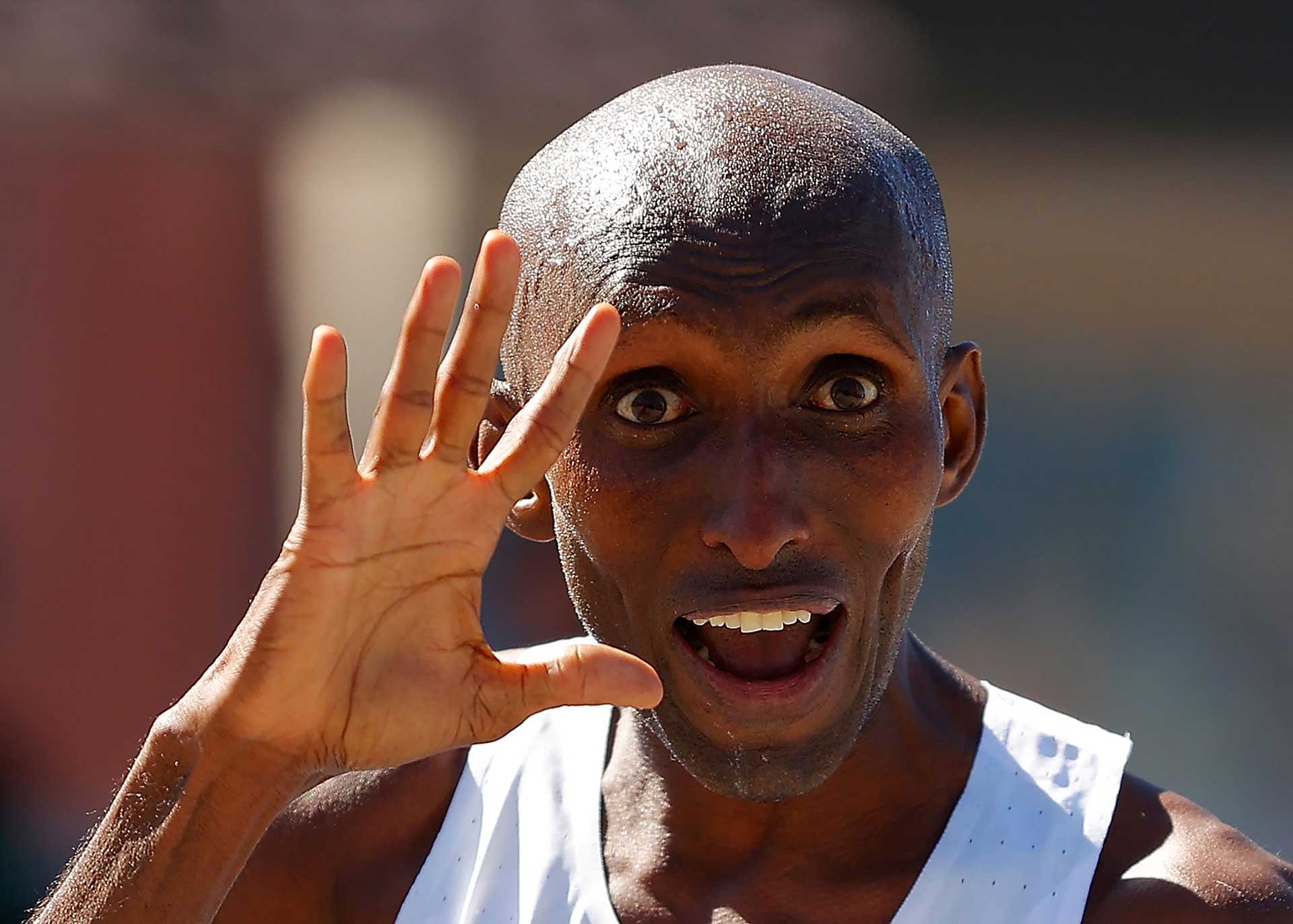
Abdi Abdirahman reacts after finishing in third place during the Men’s US Olympic marathon team Trials on February 29, 2020 in Atlanta, Georgia. Kevin C. Cox/Getty Images
Abdirahman is not the oldest Olympic athlete to ever run the marathon. Israel’s Seteng Ayele was 46 when he competed in the 2008 Games and Bohumil Honzatko was 49 when he ran for Czechoslovakia in 1924.
12.2 miles



Ryo Miyake
After the postponement of the Tokyo Olympics, Ryo Miyake, a Japanese fencer, saw his sporting career put on hold. Instead, he took up a new job delivering food for Uber Eats. A silver medalist at London 2012, Miyake turned to Uber Eats as a way to make extra cash and stay in shape during the pandemic. But the postponement of the Games proved to be a mental challenge, too. “It’s been very difficult. After all, the Olympics are like God, an absolute existence for athletes,” Miyake told CNN earlier this year. “It’s like running a full marathon for four years … adding another year is like we have to keep on running before reaching the goal.”
Read more
“Adding another year … we have to keep on running before reaching the goal.”
AFP/Getty Images/CNN Illustration
According to the US’ National Institutes of Health, after the age of 40, elite distance runners start to lose muscle fibers and slow down. But the global pandemic and an ankle injury, more likely than age, posed the greatest challenges to Abdirahman.
In March, just a few weeks after the Trials, most sporting events around the world and in the US came to a halt.
The NBA suspended its season, Major League Baseball postponed spring training, and eventually, the 2020 Tokyo Olympics were delayed by a year. Abdirahman agreed with the decision.
“There are more important things in life than just the Games,” he says. “The Games will go on if life gets back to normal, and life wasn’t normal.”
The postponement cost Olympic organizers, sponsors and broadcasters billions of dollars. Athletes were affected, too — financially, emotionally and physically. Over the next several months, most of the major marathons — Boston, New York City and Chicago — were canceled. Access to facilities and teammates was limited and training schedules were prolonged. Without any races or training camps on the horizon, most professional runners lost out on significant sources of income.
13.6 miles
An Olympic flame out
The lighting ceremony of the Olympic flame took place in Olympia, Greece, on March 12. Due to concerns over coronavirus transmission, the audience was kept small. The relay, scheduled to travel to all 47 prefectures of Japan over 121 days from March 26, was suspended the next day amid coronavirus concerns.
Abdirahman, who is based in Tucson, AZ, said he had to rely on money he received from his Nike sponsorship contract and his personal savings to make ends meet.
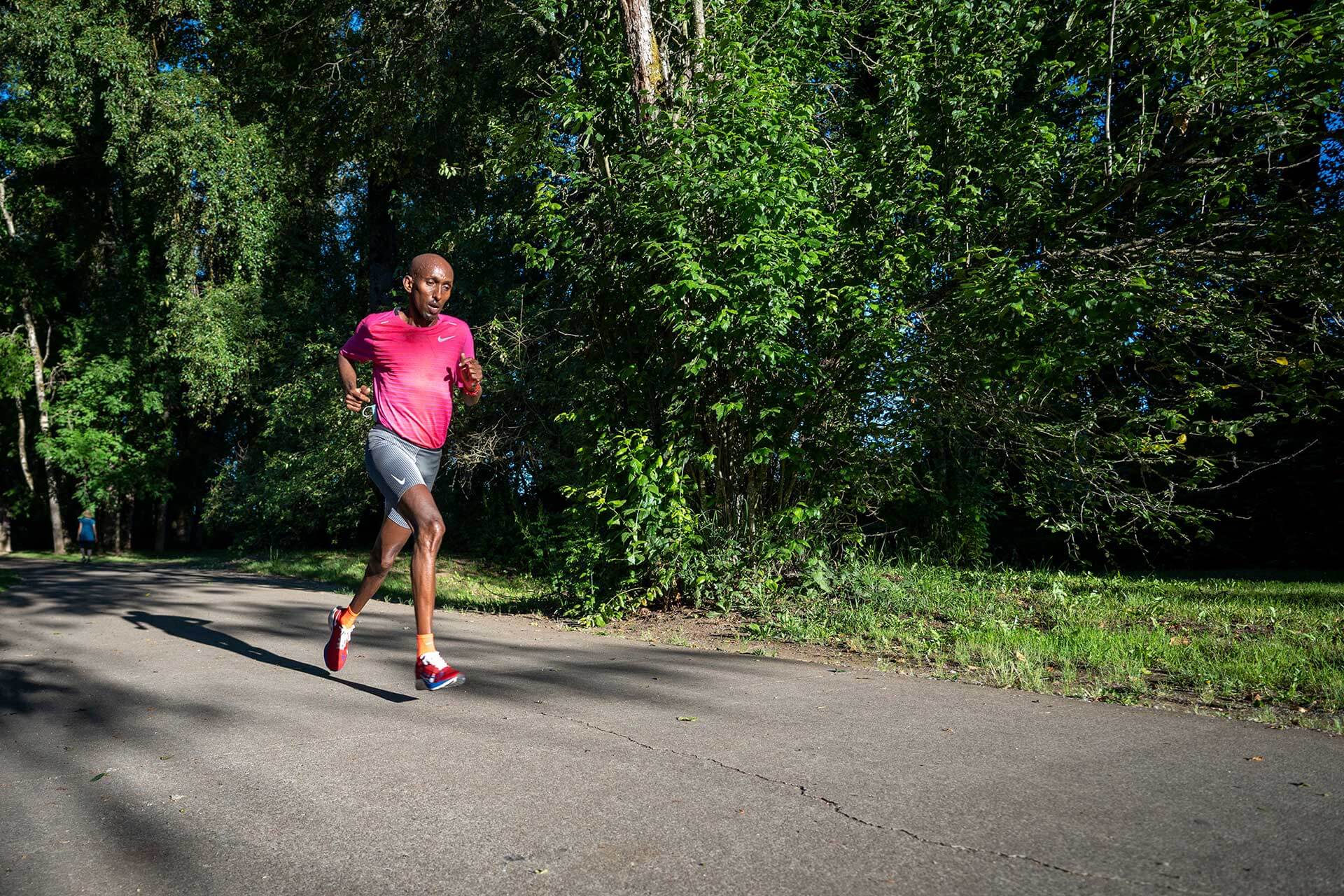
Abdirahman trains in Eugene, Oregon, on June 20. Jasper Colt/USA TODAY
He also had to adjust training timelines and routines. At first, Abdirahman ran fewer miles than normal — just enough to stay in shape. The members of his international training group, the Mudane Team, canceled a training trip to Arizona.
Eventually, he returned to the training program he learned from his coach and mentor of over 20 years, Dave Murray. “I know Abdi in and out,” Murray tells CNN. “I know what’s good for him in terms of training. We’ve been with him so long that I don’t really need to coach him. I said, ‘Abdi, just do what we’ve been doing.’ And he knows exactly what I’m talking about.”
Murray’s training regimen is based on his philosophy of simplicity, consistency and capping Abdirahman’s weekly mileage to help prevent injury. Abdirahman logs only about 100 miles per week, which is low for elite runners. To hit this number, he runs almost every day — including long runs (20 miles or more) at the weekend and speed work on the track. Weight training is also part of the routine.
15.1 miles
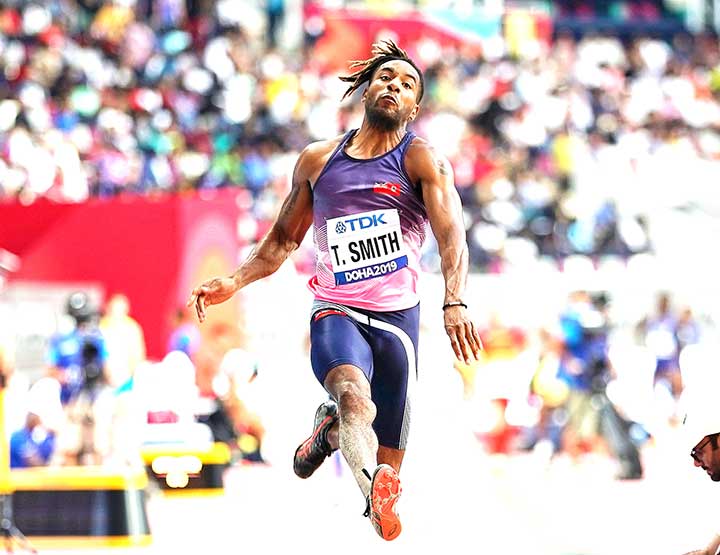


Sandi Morris and Tyrone Smith
For husband and wife Sandi Morris and Tyrone Smith, the postponement of the Olympics was like being thrown into “purgatory.” Morris, a pole vaulter from the United States, and Smith, a long jumper from Bermuda, were forced to navigate a year of uncertainty when it came to their athletic careers, all while living and training in different parts of the US. For Smith, who is close to calling time on his athletic career, the postponement was hard to take. “I probably experienced some mild depression once that announcement came,” he told CNN earlier this year. “It was disheartening, gutting, all those words, and it took some soul-searching for me to decide: am I able to continue to do this for another year?” Smith ultimately fell just short of his bid to qualify for a fourth Olympics, while Morris will look to add to her silver medal from the 2016 Olympics in Tokyo.
Read more
“It was disheartening, gutting, all those words, and it took some soul-searching for me to decide: am I able to continue to do this for another year?”
NurPhoto/Getty Images/CNN Illustration
The start of two beautiful friendships
Abdirahman was born in Hargeisa, Somalia and says he was 16 years old when he moved with his family to the US to escape the Somali Civil war.
He didn’t start running until 1995. He was 18 and had just entered Pima Community College in Tucson, Arizona. His interest in track sparked from a desire to be social, not athletic.
“A lot of my friends were in junior college and they were doing sports,” he recalls. “So I was always the last guy at the cafeteria when everybody goes to practice. And I just figured … maybe when they go to practice, I can go to practice, too … So I just wanted to fit in with the boys.”
He first met Murray in 1997. Abdirahman was running for Pima and Murray was an assistant coach for the University of Arizona. After watching Abdirahman run a few times, Murray decided to recruit him.
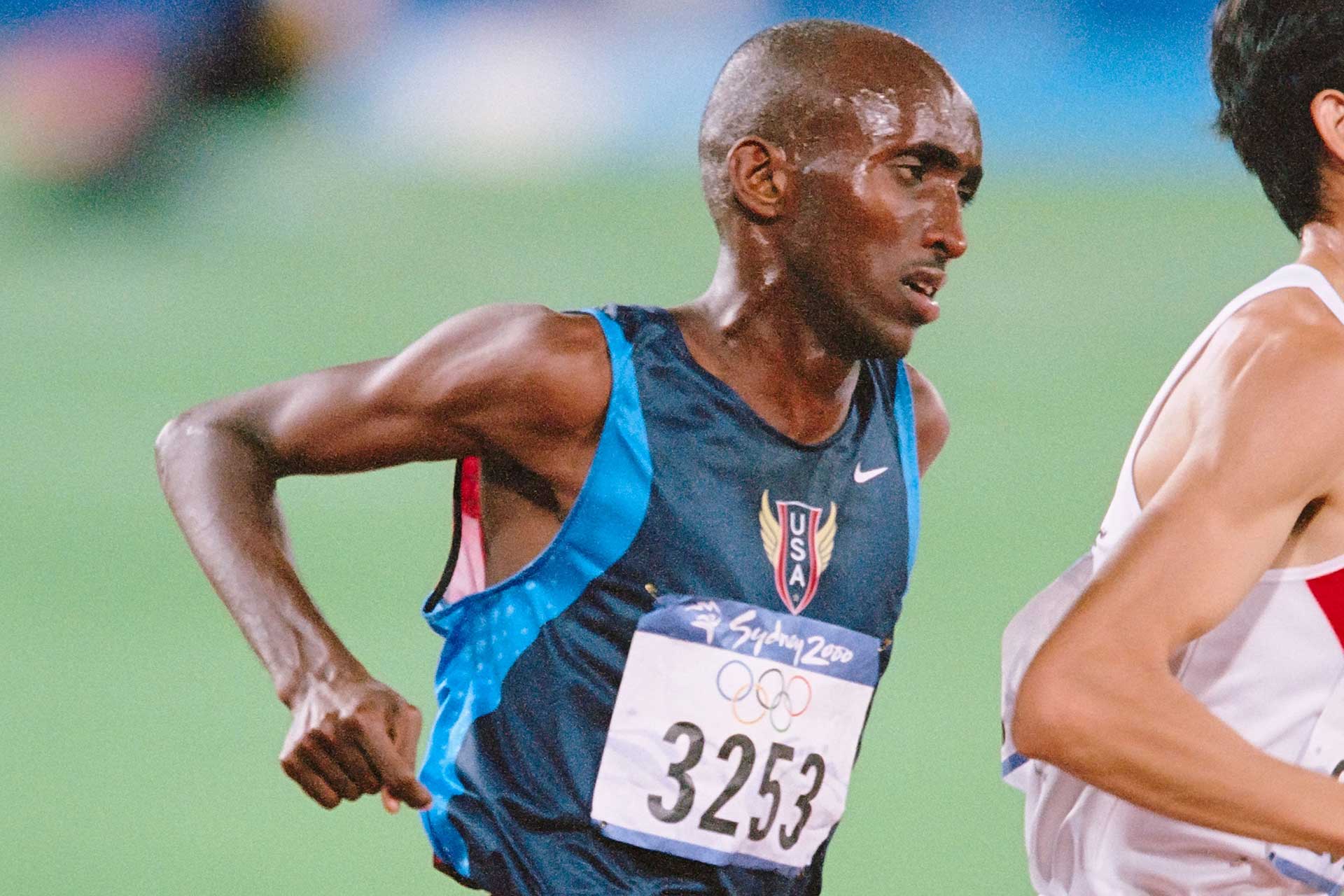
Abdirahman runs in the men’s 10,000 meter final of the 2000 Olympics on September 25, 2000 in the Olympic Stadium in Sydney, Australia. David Madison/Getty Images
“He was not any kind of a great runner in terms of scholarship material, but there was just something about him that I liked,” says Murray, now 79. Abdirahman’s times in the 10,000K and 5,000m were respectable but not jaw-dropping. Murray says he was running around 31 minutes and 15 minutes for each distance respectively.
The making of the ‘Black Cactus’
- Abdihakim “Abdi” Abdirahman is a 44-year-old distance runner from the United States.
- Born in Hargeisa, Somalia, Abdirahman moved to the United States as a teenager. He attended Pima Community College in Tucson, AZ, and the University of Arizona.
- Tokyo 2020 will be Abdirahman’s fifth Olympics. He competed in the 10,000m in 2000, 2004 and 2008 — placing 10th, 15th and 15th respectively — and the marathon in 2012, where he failed to finish due to knee injuries. Ahead of the 2016 Olympics, he missed out on qualifying with another injury.
- A four-time national champion in the 10,000m (2001, 2005, 2007, 2008), his personal best over the distance is 27:16:99. In the marathon, he has run a best of 2:08:56.
- He’s nicknamed “the Black Cactus,” a reference to the Arizona landscape.
- Abdirahman is known for his easy-going, laidback personality. His coach Dave Murray describes him as “44 going on 18.”
- After retiring from running, he says he’ll think about going into coaching or teaching children.
“To see him running, he was fluid, like those Kenyans are, like the Ethiopians are. He just looked so smooth,” Murray continues. “So actually, I offered him a [full] scholarship to the U of A.”
Abdirahman transferred to Arizona for his last two years of college and Murray’s intuition paid off.
Abdirahman improved and achieved success at college and professional levels. He was named the 1998 Pacific-10 Conference Cross Country Male Athlete of the Year and finished second at the 1998 NCAA Cross Country Championships. In 2000, he became a US citizen, qualified for his first Olympics Games in the 10,000m and got sponsored by Nike.
17.6 miles
Postponement
As the coronavirus outbreak continued to spread across the globe, on March 24, 2020, Japan’s former Prime Minister Shinzo Abe and the International Olympic Committee (IOC) agreed to postpone the Olympics until 2021, clarifying that the event will still be dubbed Tokyo 2020. The following week, the IOC announced that the Tokyo Olympics will be held from July 23 to August 8, 2021, and the Paralympics from August 24 to September 5, 2021.
Five-time Olympian Bernard Kipchirchir Lagat currently coaches distance runners at the University of Arizona. He’s 46 and semi-retired from professional running now. But he competed against Abdirahman in his college years and remembers him as a talented athlete who liked to mess with his opponents.
“He knew who to intimidate and not intimidate, so he could basically ruffle feathers with others … he could talk trash to them … and then we would just laugh at each other,” recalls Lagat.
More than athletic talent, Lagat and Abdirahman shared a language in Swahili. They both hail from eastern Africa. Abdirahman lived in a refugee camp in Lagat’s native Kenya before coming to the US. Lagat said Abdirahman would often show support by saying two phrases in Swahili.
“Every single time I see Abdi, he’ll say, ‘tufanye kazi’ — let’s do work, and then let’s go, ‘twende.’ But it [twende] also has more meaning … it’s almost like: ‘I’m with you … I’m feeling what you’re feeling. I’m seeing what you see.’”
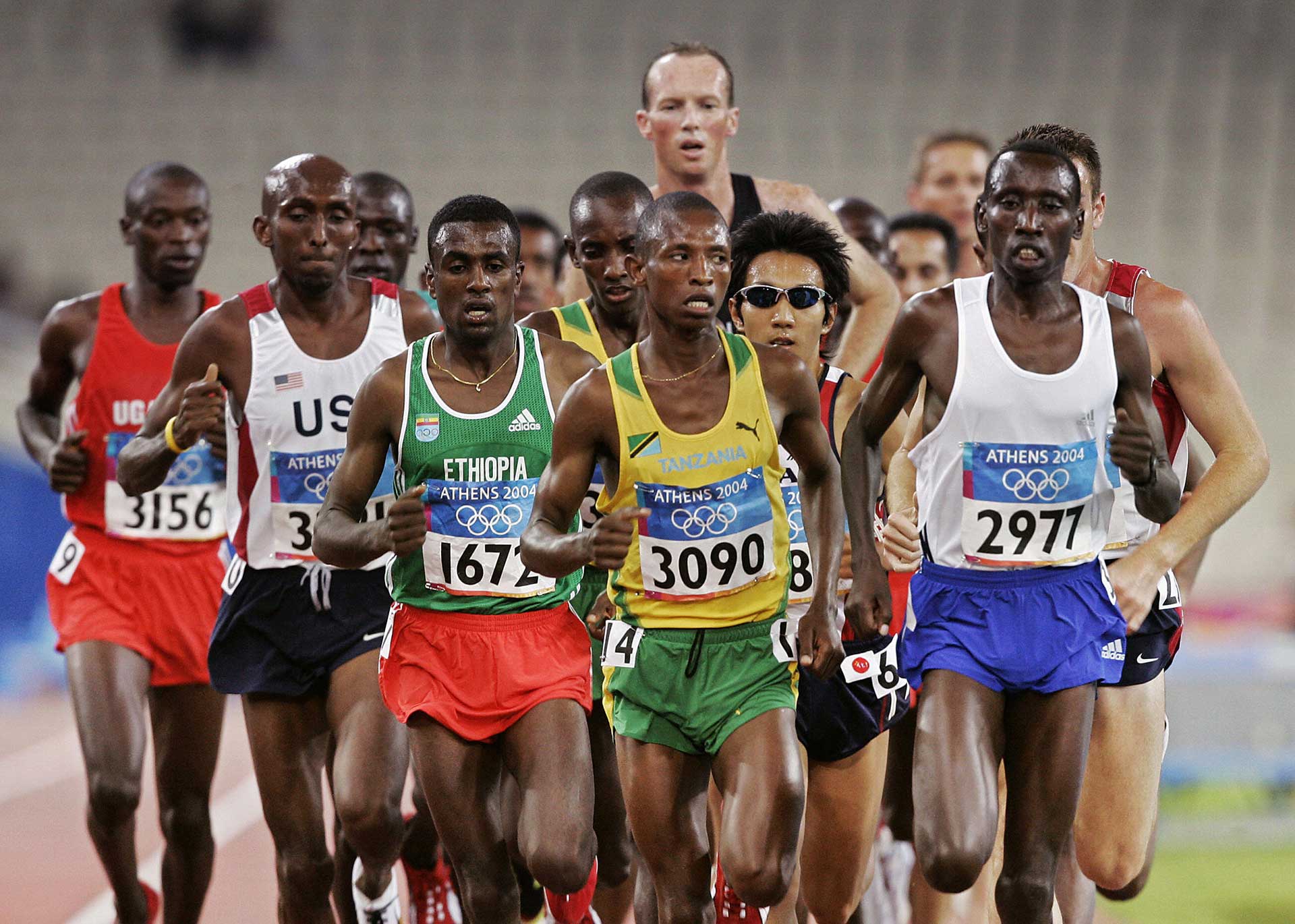
Abdirahman, second from left, competes in the men’s 10,000 meter final on August 20, 2004 during the Olympic Games in Athens, Greece. Jeff Haynes/AFP/Getty Images
Abdirahman’s friendship with Lagat continued to grow as both men thrived on the professional running scene. Abdirahman ran his second Olympic race at the 2004 Athens Games in the 10,000m event and finished 15th.
20.3 miles
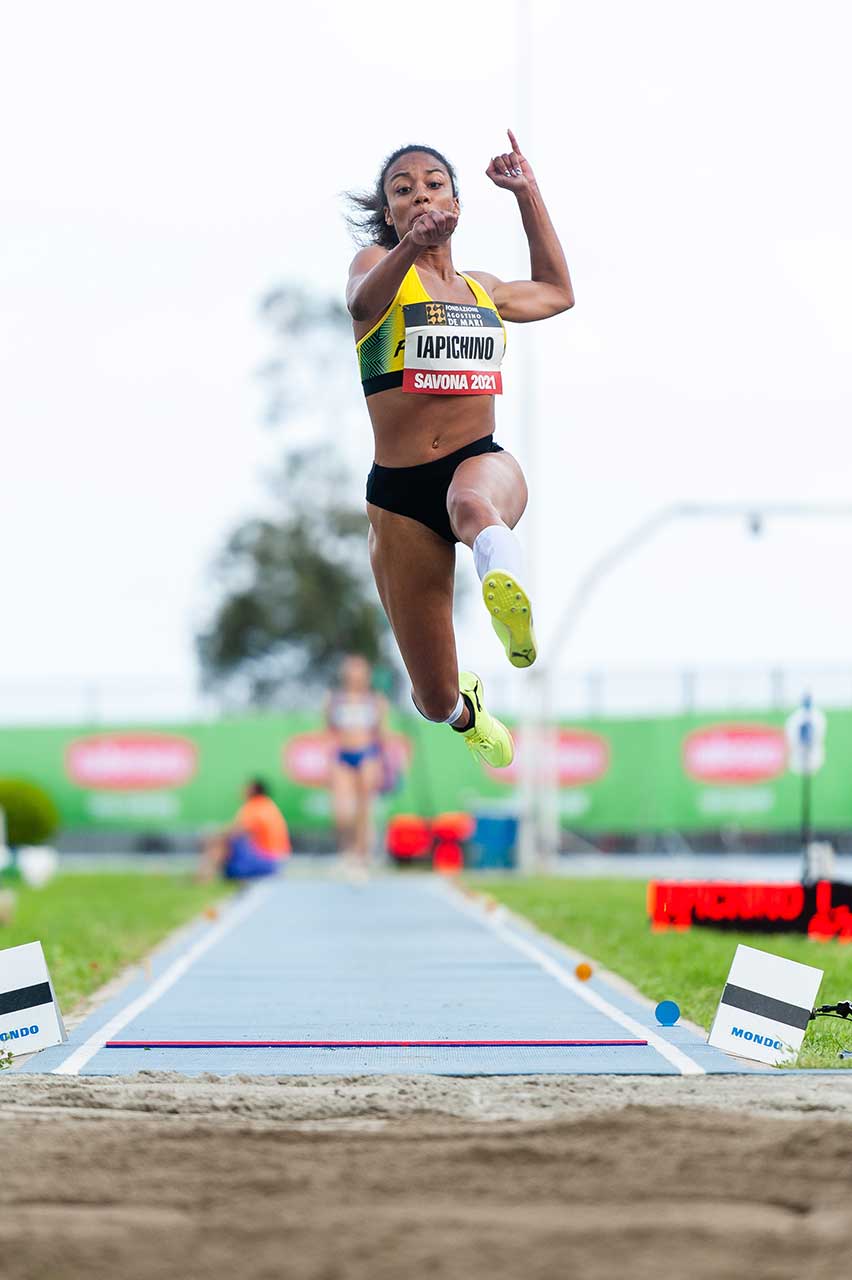

Larissa Iapichino
She’s only just turned 19, but Larissa Iapichino is already gearing up for her first Olympics. The Italian long jumper has enjoyed a stellar year so far having broken the junior indoor world record with a jump that also equaled her mother’s national indoor record of 6.91 meters. Iapichino’s mother, Fiona May, competed at five Olympics during her career and has been passing on some words of advice. “She said that you need to be there and feel the emotions, to feel the atmosphere that is typical of the Olympic Games,” Iapichino told CNN. “She couldn’t describe it to me. She said you need to feel it on your own skin.”
Read more
“She couldn’t describe it to me. She said you need to feel it on your own skin.”
Marco Mantovani/Getty Images/CNN Illustration
He continued to race the 10,000m and other distances for a few more years, winning several track and road competitions. But over time, he says, injuries hampered his progress and his performance fluctuated.
Murray also noticed that Abdirahman’s sprint “kick” at the end of races wasn’t getting stronger. Some critics suggested the runner’s career was over, but Murray recommended a change instead. “I said, ‘Abdi, I think as you are getting older now, you might start thinking about the marathon.’”
Transitioning from the track to road races is common for distance athletes, especially as they age or are no longer fast enough to win at the elite level. Initially, Abdirahman was not thrilled. The marathon had never really been on his radar. But Murray said his stride pattern was perfect for the race, so Abdirahman gave it a shot, and in 2006, he ran 2:08:56 at the Chicago Marathon.
This was a competitive time that landed him in fourth place and ultimately convinced him that he could run the 26.2-mile race on the world stage.
Abdirahman competed in the 10,000m race at the 2008 Beijing Olympics before transitioning to the marathon. He participated in the 2012 London Games but did not finish due to knee injuries. In 2016, he suffered another injury and missed out on qualifying for the Rio Olympics.
After all the strain and disappointments, Abdirahman saw Tokyo as possible redemption. Then came the pandemic.
21.8 miles
International fans banned
With just over four months to go until the opening ceremony and with plans for a scaled-down version of the Games well underway, Tokyo 2020 organizers announced that international spectators will be refused entry into Japan to reduce the risk of Covid-19 transmission. Days later, the Tokyo Olympic torch relay began in Fukushima, the site of a nuclear disaster 10 years ago.
He says his training was going well until October 2020, when he suffered a stress fracture to his ankle. But Abdirahman did not worry too much.
“I think to be honest, it was a blessing because sometimes as an athlete, we just don’t know how to rest … And I said, ‘You know what? This will give me time just to recover, just to sit back … just to think about something else besides running.’ And that was great,” he says.
For the next three months, Abdirahman did exactly that — he caught up with friends, family and the world events he doesn’t always have time to keep track of during the racing season.
He also recorded his thoughts and reflections in a book he started writing early on in the pandemic. “Abdi’s World: The Black Cactus on Life, Running, and Fun” will be available nationwide mid-August (“The Black Cactus” is the nickname Abdirahman gave himself).
By January, his ankle healed and Abdirahman needed to get back into race shape. So he turned to his squad — a group he’s relied on for friendship, hardcore training and fun for years — the Mudane Team.
Mudane means excellency
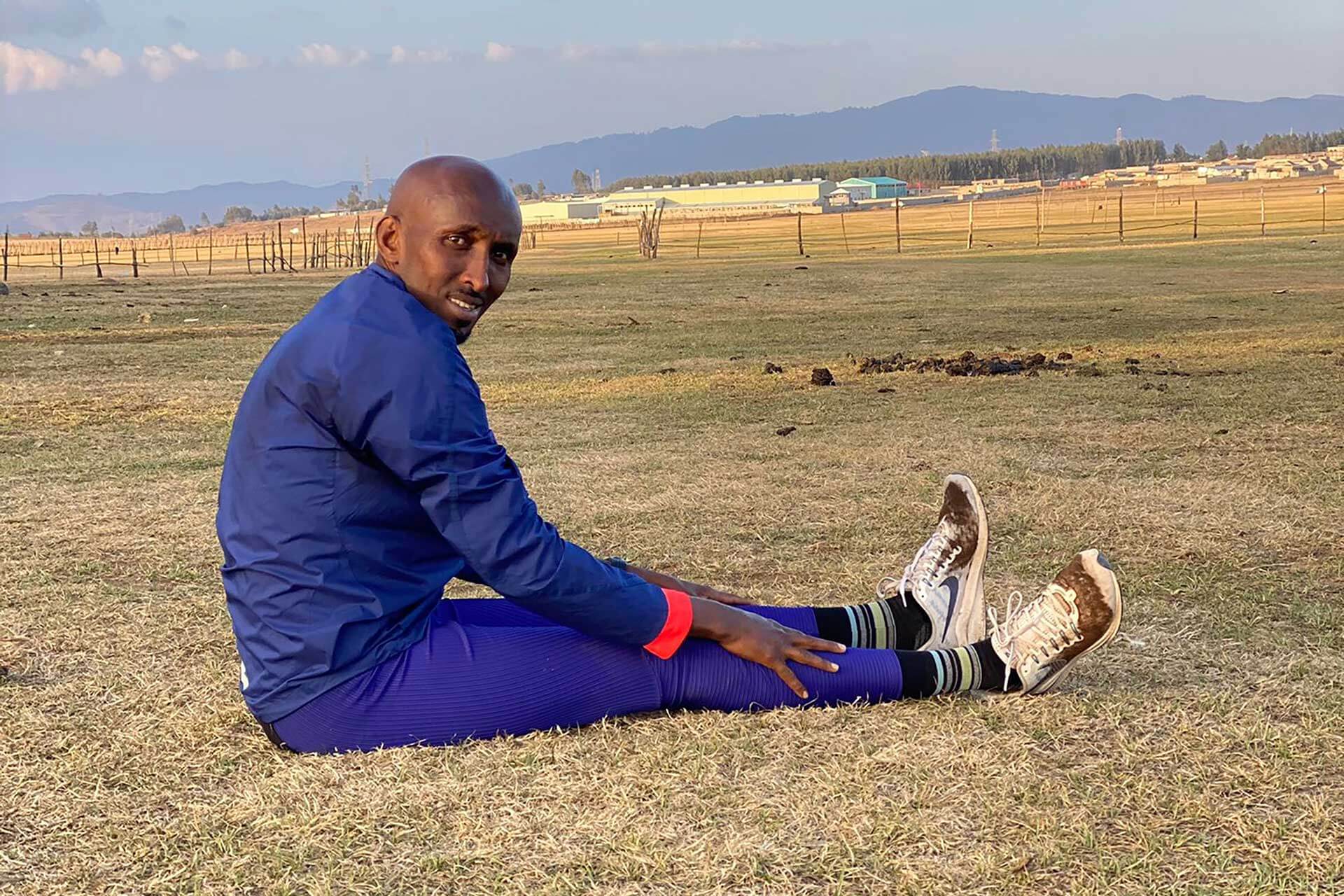
Abidirahman smiles during a training camp in Ethiopia while preparing for the 2020 Olympic Trials. Courtesy Abdi Abidirahman
Mudane means sir or excellency (like a high-ranking official) in Somali. This is a small but expanding fraternity of Somali-born professional runners in the diaspora, like Bashir Abdi who represents Belgium, Abdi Nageeye in the Netherlands and Britain’s Mohamed “Mo” Farah.
Abdirahman met up with the crew in the popular yet developing district of Sululta, Ethiopia. They train there in winter, when it’s cold in the US and UK. Ethiopia’s high altitude and warmish weather make it an ideal training ground for serious distance athletes. The fact that it is home to some of the best distance runners in the world is added incentive. Farah, who is a four-time Olympic champion, is a founder of the group. He formalized it in 2016, along with Abdirahman and Abdi.
“As an athlete, you go to races, you want to want to win, you want to get a medal.”
As an athlete, you go to races, you want to want to win, you want to get a medal. And that’s my goal. And you know what a lot of people will say, that’s not realistic. But you get me to this point where I’m always believing in myself, anything can happen. We already know the clear favorite. But there’s nothing guaranteed in life. Something can happen while you’re running the race. So you know what? I’m just going to go out there, give myself a chance and compete the best and you know, my main goal is to win the race, but if I don’t win it and I give it 110%, I’ll be the happiest guy alive.
Show full transcript
“My aim is to create a group where it doesn’t matter where you’re from, what color you are. You can come together and train, work, you can achieve something out of that,” Farah tells CNN.
He first met Abdirahman at the World Cross Country Championships in 2000 in Portugal and they’ve been good friends ever since. Farah, 38, likes to point out that he’s younger than Abdirahman. But he won’t hesitate to acknowledge that he sees his Somali-born American friend as a role model too.
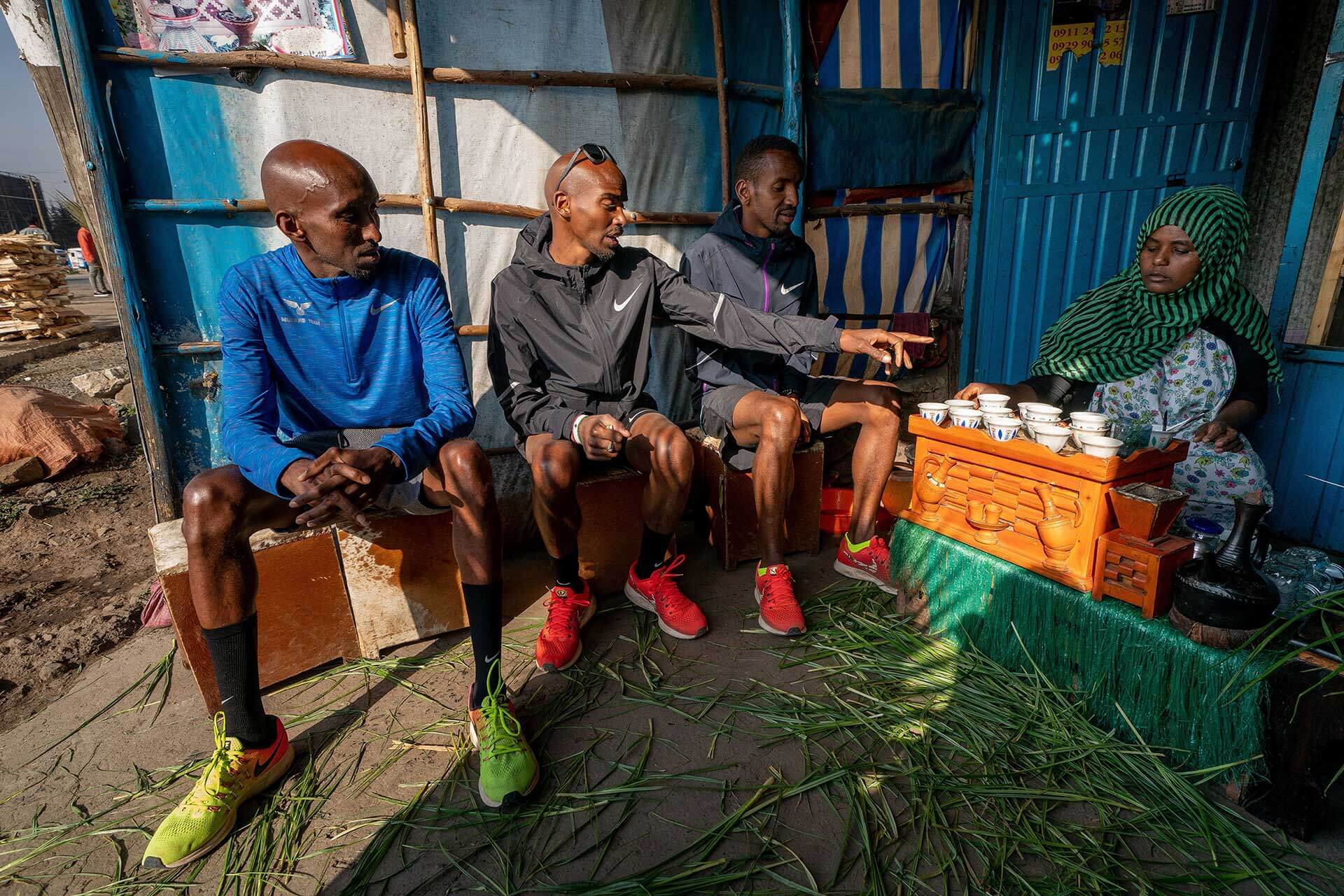
Training partners Abdirahman, left, Mo Farah of Great Britain, center, and Bashir Abdi of Belgium share a morning coffee near Addis Ababa, Ethiopia in 2018. Bob Martin/Shutterstock
“He’s a father figure … and he continues to push himself and … he inspires all of us. At that age, to make his fifth Olympics — I think it’s something that should be celebrated,” says Farah, who narrowly missed qualifying for the 10,000m event in Tokyo. “And in fact, I was even joking around. I said, ‘Abdi, mate, you should be carrying the flag’ … because often, people want to make one Olympics, and … here we go, he’s making his fifth one.”
23.2 miles
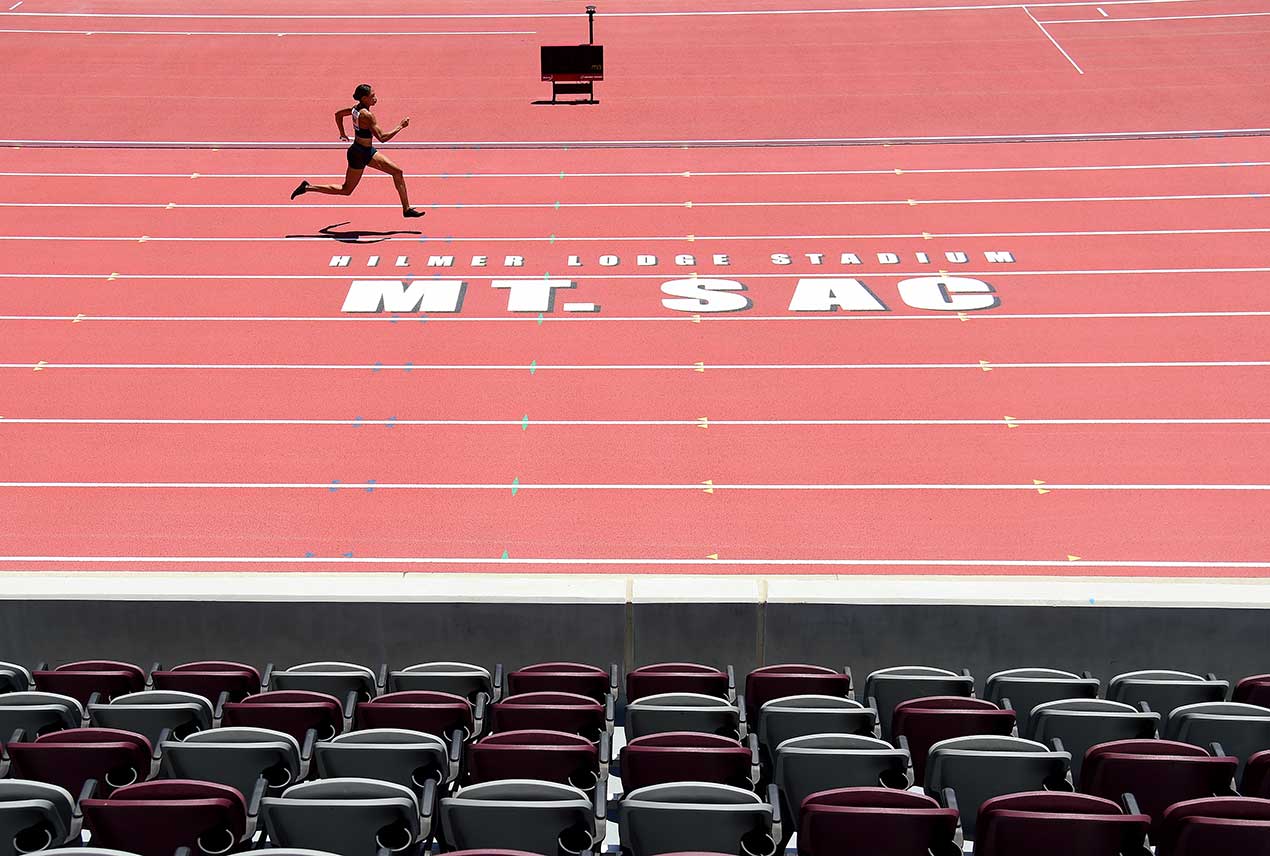


Allyson Felix
Allyson Felix is a veteran star of the USA track and field team having competed at four previous Games, but the past year has been unlike any other as she’s been forced to train on empty soccer fields, beaches and the streets around her home in Los Angeles. This will also be Felix’s first Olympics as a mother following the birth of her daughter Camryn in 2018 — something she says is her proudest achievement. Over the course of her career, Felix’s vision for her legacy has shifted. “I think if you had asked me that question years ago, it would have been records on the track or how fast I ran,” Felix told CNN. “But now, I think it’s really about having some impact on my sport. I really want my legacy to be one of someone who fought for women.”
Read more
“But now, I think it’s really about having some impact on my sport. I really want my legacy to be one of someone who fought for women.”
Getty Images/CNN Illustration
The team trained in Ethiopia for the first three months of 2021. Covid cases were rising at the time and testing was hard to come by.
“You know, he inspires all of us in terms of, at that age to make that, his fifth Olympics. I think it’s something should be celebrated.”
Yeah, he’s a father figure. We kind of often, you know, look up to him in a different way because he’s a lot older than us. We have got a lot of respect for him, you know, he inspires all of us in terms of, at that age, to make that, his fifth Olympics — I think it’s something should be celebrated. And in fact, I was even joking around. I said, “Abdi, mate, you should be carrying the flag” because often, people want to make one Olympic, and him, here we go, he’s making his fifth one.
Show full transcript
Ethiopia was hit hard by the coronavirus and just about one percent of the country’s roughly 112 million residents have been vaccinated. The vaccination rate in Somalia — where most of the Mudane team members are from — is similar. In comparison, nearly 50% of the US population is vaccinated. Abdirahman is among them and wishes the vaccine was more widely accessible throughout Africa and the wider world. He adds he was not able to get tested in Sululta and that most people he encountered did not wear masks, so he just did his best to stay safe.
Abdirahman maintained that it was important to be there, despite the risks. He’s made training trips to Ethiopia since 2015. Both he and coach Murray say it’s helped improve his performance.
“I think that was a major factor in making the [2020 US Olympic marathon] team this last time,” says Murray. “He came back healthy … with a really tremendous distance base, and he had some of the greatest distance runners in the world to train with, like Mo Farah.”
The Mudane training camp closed at the end of March, and Abdirahman and Farah continued altitude training in Flagstaff, AZ for about 10 weeks — doing long runs and long intervals. But the amount of mileage and intensity of their workouts will decrease closer to race day.
“Two weeks out from the Olympics will be taper time,” says Abdirahman. Murray advised him to return to Tucson for a few weeks before he heads to Tokyo, to help him reacclimatize to running in the heat.
Tokyo dreams and beyond
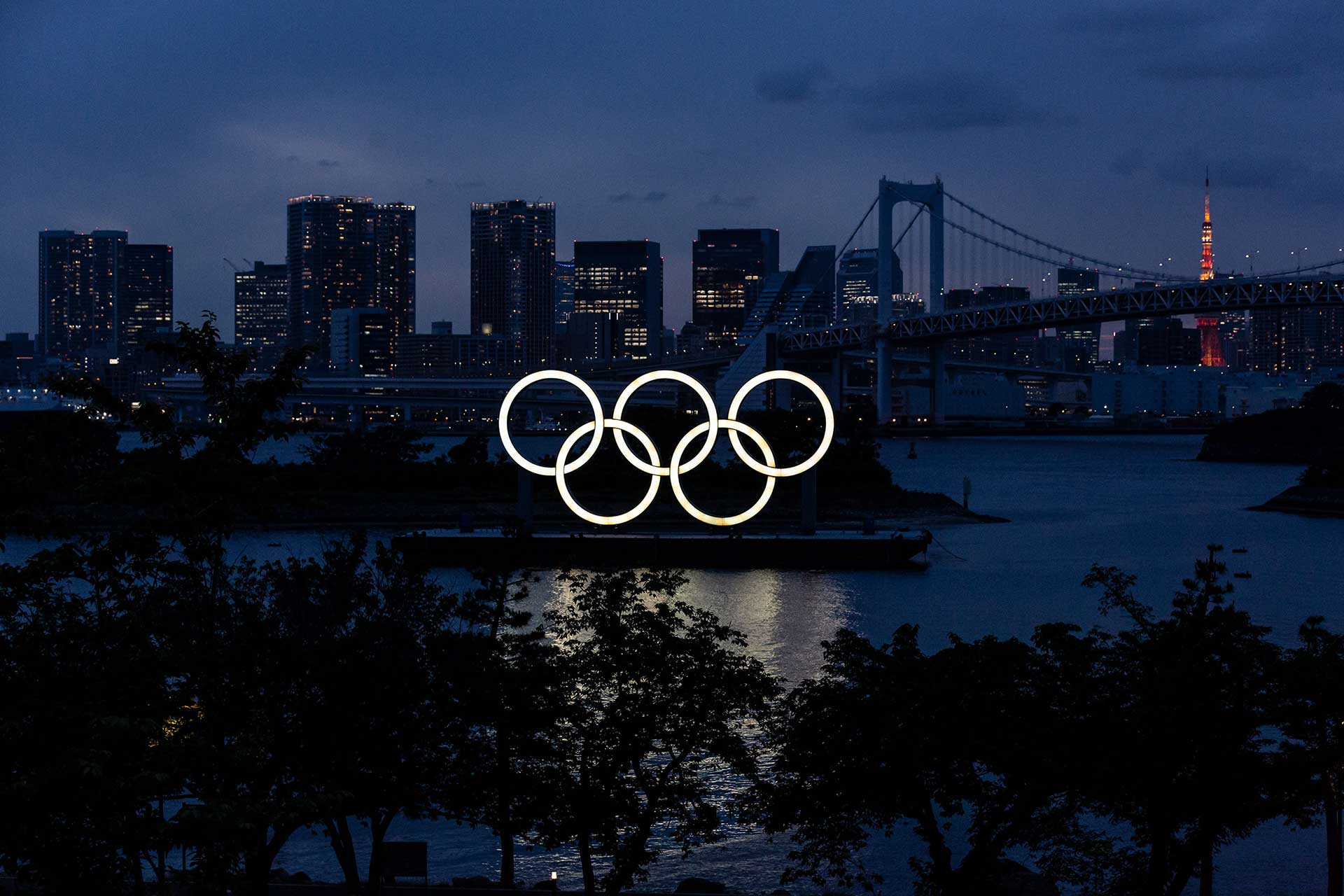
The Olympic Rings are displayed by the Odaiba Marine Park Olympic venue on June 3 in Tokyo, Japan. Yuichi Yamazaki/Getty Images
When Abdirahman does arrive in Japan, his focus will be on staying healthy and following all the new Covid protocols.
He’ll also be subject to a rule that’s connected to supporting social justice causes.
In April, the International Olympic Committee (IOC) announced it would uphold Rule 50 — a ban that prevents athletes from protesting or demonstrating at the Olympics. This is the same rule that penalized the podium protests of sprinters Tommie Smith and John Carlos during the 1968 Olympics. The IOC said its decision was based on a 10-month consultation process with over 3,500 athletes in all 41 Olympic sports.
But earlier this month, the IOC amended the rule slightly, citing more feedback from the “global athlete community.” Now Olympic athletes can protest in mixed zones, press conferences and during interviews — as long as the expression is “not targeted, directly or indirectly, against people, countries and/or their dignity.” Athletes can also protest on the field of play — either before the start of competition or while they are being introduced.
This move comes after the US Olympic & Paralympic Committee allowed Team USA athletes to hold up a fist, kneel and wear garments promoting racial and social justice in US Olympic and Paralympic Trials events.
Hammer throw athlete Gwen Berry tested this policy when she turned away from the American flag during a medal ceremony at the Olympic Trials last month. She did it while the national anthem played and also held a t-shirt with the words “activist athlete” over her head.
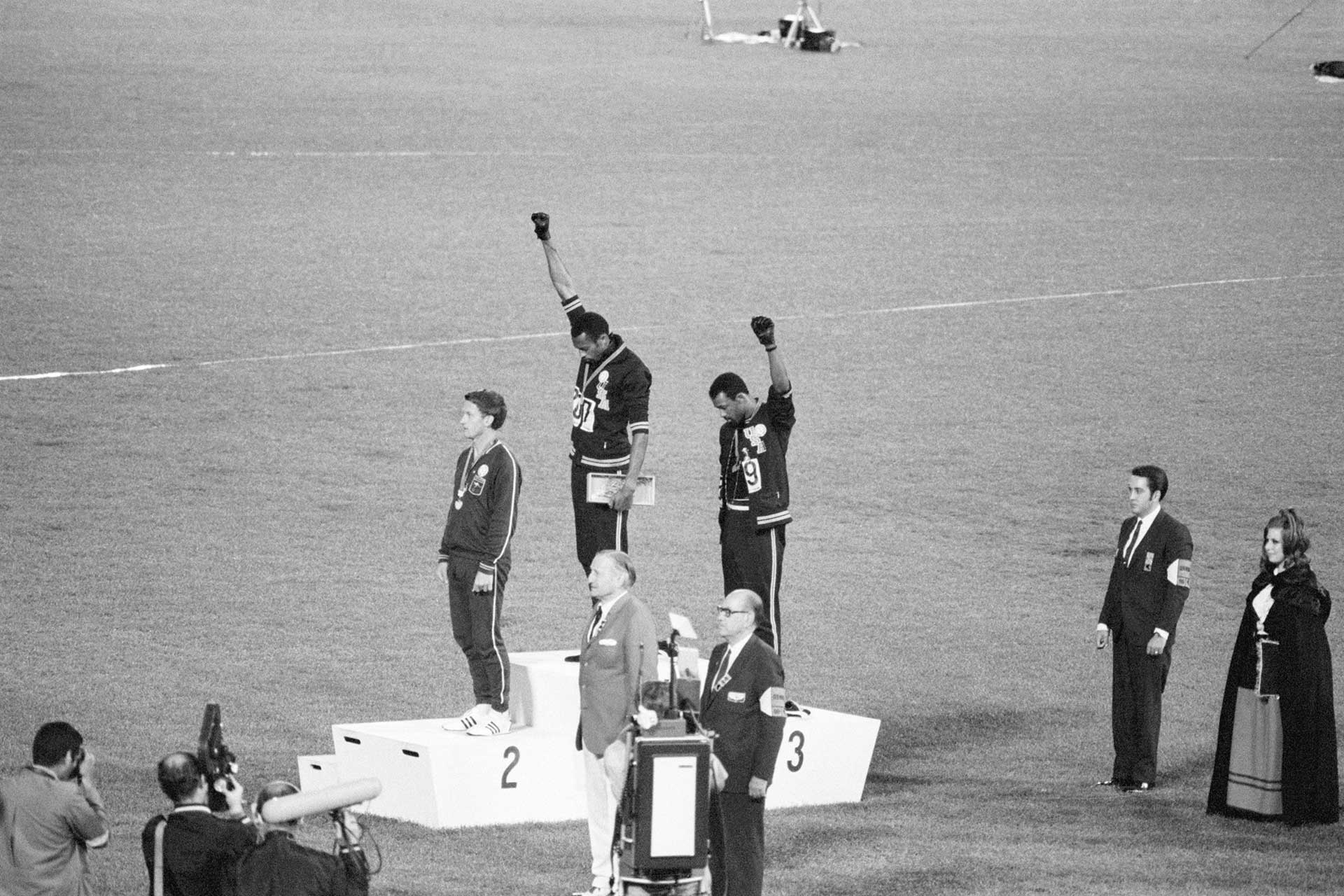
American runners Tommie Smith, center, and John Carlos, right, raise their fists in protest while on the podium during the 1968 Olympics. Bettmann/Getty Images
Abdirahman did not comment on Berry’s protest and isn’t planning to engage in activism in Tokyo. But as someone who considers himself a proud American, issues like inequality and police misconduct trouble him. “Social justice is part of our lives and it got bigger during the pandemic … Just imagine how many innocent people have suffered before this social media, these pictures, before cell phones,” he says.
A closer look at the Olympic Marathon
- The Olympics’ first ever marathon in 1896 was won by 23-year-old Greek shepherd Spyridon Louis, who even found time to eat an egg and drink a glass of wine during the race.
- According to David Goldblatt, author of “The Games: A Global History of the Olympics,” that first marathon “proved to be the most important event of the Games, generating the kind of modern mythological hero and collective stadium spectacle.”
- American Joan Benoit Samuelson won the first women’s Olympic marathon, which was held in Los Angeles at the 1984 Games.
- The 1952 Helsinki Games marked the first time the U.S. marathon team included a Black man — Ted Corbitt. Tokyo 2020 will be the first time Black women — Aliphine Tuliamuk and Sally Kipyego — have been on the US marathon team.
- Eliud Kipchoge, holds the men’s world record for the marathon, will be looking to defend his Olympic title in Tokyo. Among the favorites to win the woman’s race are Brigid Kosgei and half-marathon world record holder Ruth Chepngetich.
- In October 2019, Kipchoge successfully completed the first ever marathon under two hours in the Austrian capital of Vienna, though the milestone didn’t count as a world record. He ran behind a car — a condition not allowed under IAAF sanctions — and was assisted by an army of 30 pacemakers.
“As a Black man, I live Black Lives Matter. A lot of people say, ‘But why do they say Black lives matter? Do White lives matter?’ And I say, ‘Yes, White lives matter, too. Because at the end of the day, you don’t suffer at the hands of the police every day like we do. So we are fighting. If you were suffering, if you go through what we’re going through, I would support you.’”
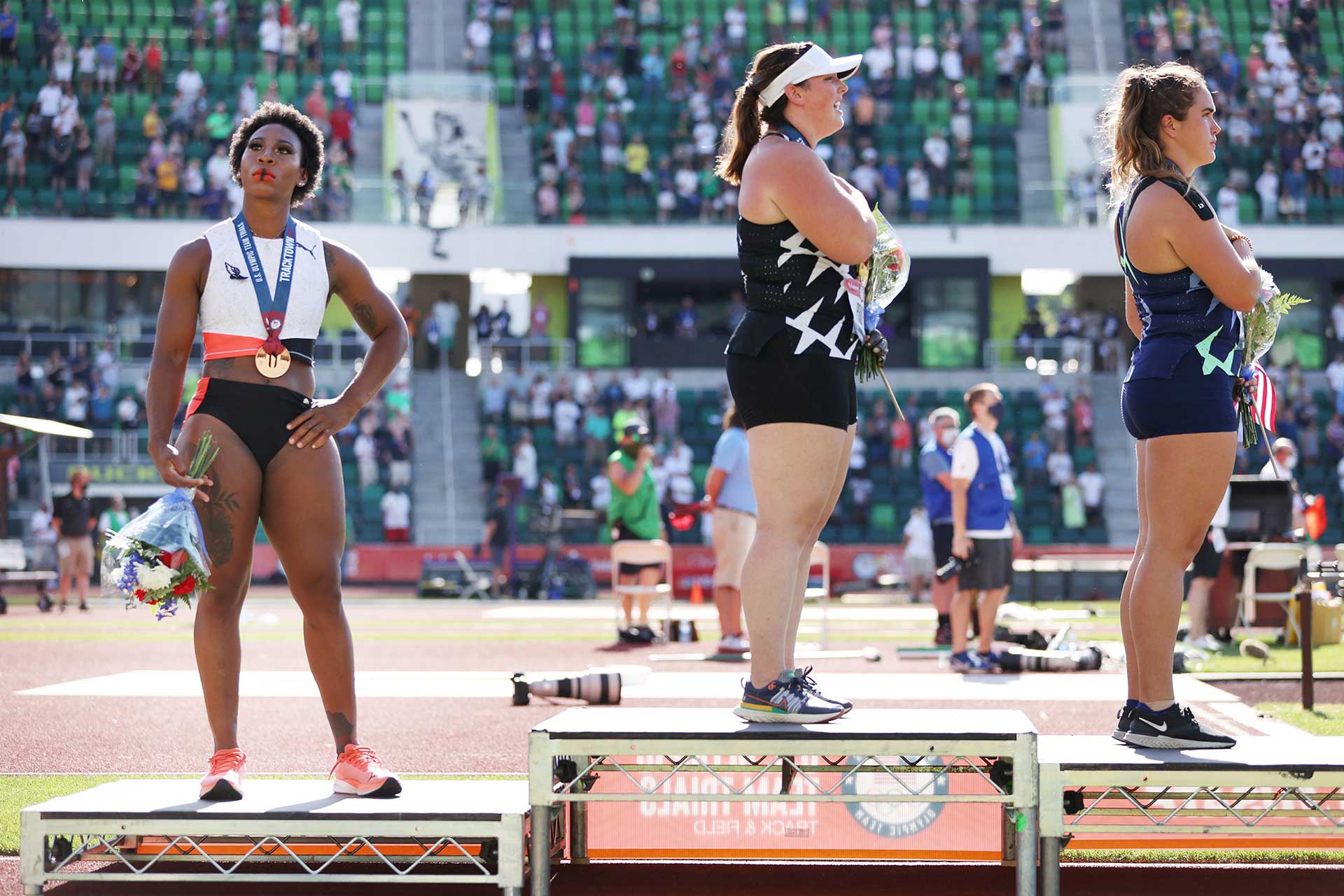
Gwen Berry turns away from the American flag during the playing of the national anthem at the US Olympic Track & Field Trials in Eugene, Oregon, on June 26, 2021. Patrick Smith/Getty Images
Abdirahman has time to figure out exactly if and how he’ll get more deeply involved in social justice causes. He’ll take a break after the Olympics to recover and promote his book, “Abdi’s World.” When he retires from the sport, he says he’ll keep running for fun and consider coaching or teaching children.
But for now, his focus is on training and medaling in Tokyo. He’s not considered a favorite going into this race and will likely need to finish well under his personal record of 2:08:56 to take home a medal. Kenya’s Samuel Wanjiru set the Olympic record for the marathon at 2:06:32 during the 2008 Beijing Games. The fastest-ever American performance in the Olympic marathon was 2:10:05 — Rupp captured the bronze with that time at the 2016 Rio Olympics.
25.2 miles
‘Suicide mission’
As organizers pressed on with plans to host the Games, opposition among the Japanese public started to grow. In May, amid a fourth wave of infections in Japan, a petition calling for the cancellation of the Tokyo Olympics garnered hundreds of thousands of signatures. Hiroshi Mikitani, CEO of top Japanese e-commerce company Rakuten, told CNN Business that hosting the Olympics amounted to a “suicide mission.”
Abdirahman, whose voice rarely waivers from an upbeat, relaxed tone, acknowledges that he feels pressure to perform well. But the pressure is a bit different this time around.
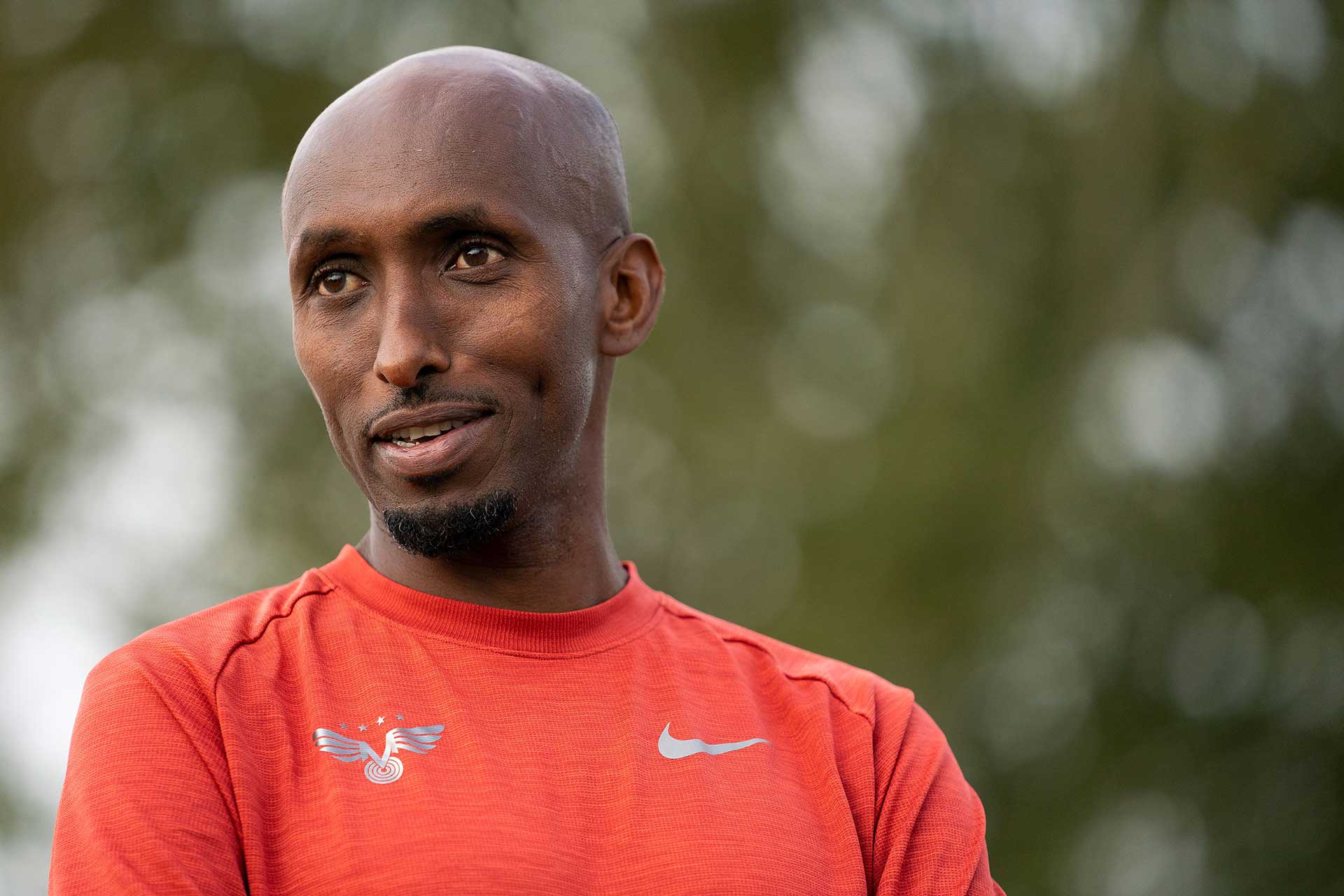
Abdirahman participates in the Humana Rock n Roll Philadelphia Half Marathon on September 14, 2019, in Philadelphia, Pennsylvania. Patrick McDermott/Getty Images
“It might be my last one; my last time representing my country. Probably. Most likely. You know, it’s going to be tough, it’s going to be emotional,” he says.
Just a few months earlier, he spoke of potentially going for a sixth Olympics in 2024. But as Tokyo approaches, his tone has changed a little. He’s still confident in his talent and pleased with his training, but he says he’s more realistic now. “It’s been a great ride. Everything good has to come to an end at some point.”
Coach Murray just hopes Abdirahman will run a competitive race and not start out too fast. He won’t be joining him in Tokyo (Murray has never traveled to any Games with Abdirahman). Instead, Murray says he’ll do what he always does when Abdirahman competes in the Olympics: call him every day he’s away from home.
No matter where Abdirahman places in Sapporo, he’s already accomplished what few people ever will. Beyond making Olympic team number five, he’s survived a civil war, thrived in a country he wasn’t born in and never stopped believing in himself. Yet, what made 2020 challenging for Abdirahman, was largely what made it difficult for so many people. Navigating a global pandemic, a worldwide reckoning on race, and so much uncertainty has been a long journey with highs and lows — not so different from a marathon. And if we’ve learned anything from Abdirahman, a true master of the marathon, it’s to breathe, be kind and keep putting one foot in front of the other.
26.2 miles
A Games like no other
While Olympic competition is already underway, Tokyo 2020 officially kicks off with its Opening Ceremony on July 23, marking the end of an arduous journey for athletes, organizers and the general public. Although the coronavirus pandemic still rages on across the globe, the holding of the planet’s largest sporting competition provides the world with a chance to enjoy and marvel at the peak of athletic greatness, despite the difficult circumstances it finds itself in.
Source: http://rss.cnn.com/~r/rss/cnn_topstories/~3/kMhlJ9-B-Jw/


















